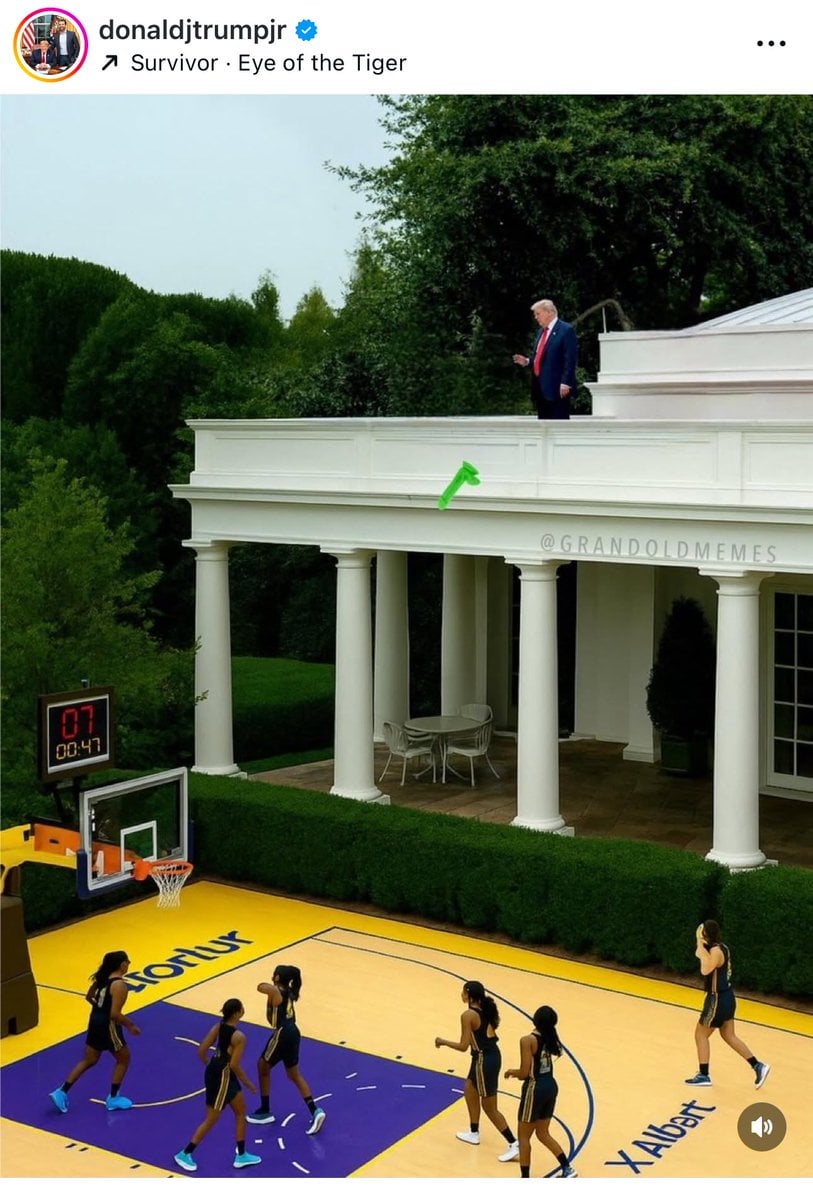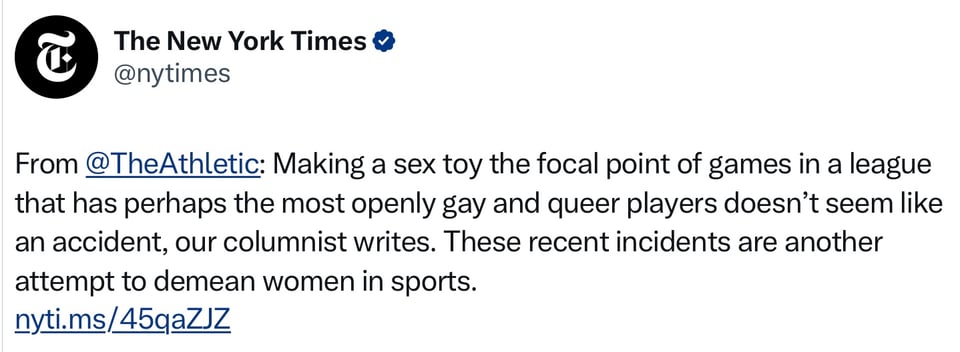Tuesday, August 12, 2025. Annette’s Roundup for Democracy.
What the WNBA means to me.

The “W,” as it is often called, is more than basketball sports programming. It is the fullest expression we have of the dreams of equality put forth by the women’s movement of the 1960’s.
There may be only 28.7% female legislators in the House of Representatives and only 26% female Senators, and we have not yet been able to elect a Woman President, but most nights in 2025, in living color, from early May through mid October, we have packs of strong, confident female athletes on our screens, fulfilling the promise of equality by their very existence.
Title IX, when signed into law by Richard Nixon on June 23, 1972, offered a simple text:
“No person in the United States shall, on the basis of sex, be excluded from participation in, be denied the benefits of, or be subjected to discrimination under any education program or activity receiving Federal financial assistance.”
But sports proved to be only a start. Title IX was the first piece of legislation that embodied the aspirations for equality that had been fought for and growing since Seneca Falls, the first women’s rights convention held in 1848. More than half a century later, the cry which started at Seneca Falls spurred the nation to pass the 19th amendment in 1920, giving women the right to vote.
Creating a revolution in sports, Title IX was soon responsible for greater change as well. It quickly became the legal vehicle to address sexual harassment and assault on campus, as well as bias in admissions, hiring, and promotion in academia.
The women of the WNBA are the children of Title IX all grown up… the Right Wing of America’s worst nightmares. They wear their politics on their sleeves, broadcast their activism loud and clear, and speak for women’s equality and reproductive freedom, making clear too that some in their ranks are “out” lesbians with children and same-sex spouses.
The relationship between WNBA players and their fans is no traditional sports relationship. These players embody their fans’ hopes and dreams for a better and fairer America, where women’s strength is celebrated, diversity is a given, and equal pay is a shared goal within reach. Friendships that cross racial, national, and sexual identity lines.- these are who the WNBA is.
Recently, committed players from teams across the country appeared at games, during the collective bargaining agreement (CBA) negotiations with the League, wearing “Pay Us What You Owe Us“ tee shirts, electrifying fans who chanted back “Pay them! Pay them!”

Yes, there have been flare-ups, like the racial tension stirred when Caitlin Clark’s arrival brought her outsized media attention. But time and again, players and teams pushed back against the narrative of division. This is a League that fights for fairness—across race, gender, sexuality, and even national borders.
The New York Liberty’s current championship roster, for instance, has six international players—a legacy of the years when American women had to play overseas for better pay, building bonds with teammates from around the globe. Today, the League embraces them all. Diversity, equity, and inclusion aren’t slogans here—they are the WNBA’s DNA.
And the far right knows it.
Starting on July 26, dildos were thrown on WNBA basketball courts in 3 American cities-an attempt to humiliate, mock and even threaten the players - a sexual threat against their gender - not yet as dangerous but metaphorically the equivalent of KKK crosses on fire in the backyards of blacks racists perceived as disruptive of the racial order.
The players laughed off the attacks publicly, but the message was clear: the WNBA stands for more than basketball, and its opponents know it.
This is why Donald Trump, Jr., after the initial Dildo attacks, posted an AI photo of his father joining the misogynistic attacks, by throwing down a dildo from the White House roof onto a basketball court filled with women players.

Many - including me - recognize how much is at stake in each WNBA game.
Did you hear that Trump’s Defense Secretary Pete Hegseth reposted a video on X featuring pastors calling for the repeal of women’s right to vote—and urging wives to submit to their husbands? He captioned it: “All of Christ for All of Life.”
In this political environment, WNBA players are our warriors and critical spokespeople, fighting for women’s right to equality, fighting for women’s right to fight.(Annette Niemtzow)
A sex toy hit a WNBA court mid-game. Valkyries-Dream players had thoughts.

WNBA fans and observers lit up social media Tuesday night after someone in the crowd tossed a neon green sex toy onto the court during a game between the Golden State Valkyries and homecourt Atlanta Dream.
“I mean, first of all, it was super dangerous. And then when we found out what it was, I guess we just started laughing,” Valkyries forward Cecilia Zandalasini said between snickers during a postgame news conference. “I’ve never seen anything like that. I’m just glad we worked through that situation. We stayed locked in, we stayed concentrated.”
Valkyries teammate Tiffany Hayes then asked a reporter during the news conference whether they knew what the object was.
“Yeah, one of our players almost got hit with it, so that’s very dangerous,” Hayes said, grinning and shaking her head, after the reporter responded affirmatively. “We persevered.”
The incident occurred during the fourth quarter, with less than a minute left on the clock. Television cameras briefly zoomed in on the sex toy before cutting away to another shot. A security guard later appeared on-screen, donning gloves and removing the object with a towel while laughing.
The Valkyries went on to win 77-75.(The Athletic, July 30)
WNBA sex toy incidents may be linked to cryptocurrency group’s money scheme.
Late in the first half of a Los Angeles Sparks-Indiana Fever game on Tuesday night, a neon green sex toy thrown from the stands landed on the floor of Crypto.com Arena, at the feet of Indiana guard Sophie Cunningham.
Simultaneously, a group of people during an audio livestream on X reveled in the moment and celebrated its potential to help boost the value of a particular memecoin, a cryptocurrency deriving from an internet meme but traded through very real markets online. The coin was created July 28, the day before the first occurrence of a sex toy being thrown on a WNBA court. As of Thursday, the coin’s worth had nearly tripled in its first week.
“Someone is tweeting that there’s one at the Sparks game,” one person said on the stream.
“That is literally the best case scenario that we could possibly imagine,” another replied, because the sex toy had fallen near Cunningham, who had previously posted a plea for spectators not to throw the objects onto the court, which was met with numerous replies of memes involving the phallic object.
The disruption in Los Angeles — as well as others that occurred that evening — appeared to be part of a coordinated effort, borne out of conversations held in some particularly murky, often mysterious corners of internet culture, social media and opportunistic plays in the cryptocurrency markets.
Like many things on the internet, users speaking about the disruptions have often shielded their identities through pseudonyms even as they interact in open forums on X and on the messaging platform Telegram. And the memecoin itself appeared to be one in a long line of novelty digital assets originating from a meme, part of an odd intersection of jokes that turn a gag into something users try to spin into play for money, like Dogecoin or Shiba Inu coin.
One user speaking on an X stream called the attention created by the WNBA disruptions and the resulting chatter “next level.”
“This is empowering to every f—ing crypto community to start thinking outside the box. Get creative and f—ing do something that makes people actually laugh. Memecoins should make you laugh,” he said, adding, “The whole mission with this was focus on making an impact in crypto culture.”
It appears the WNBA and its athletes are central to the joke in spite of their objections. And the conversation about the disruptions has created opportunities for detractors of women’s basketball to mock the league and women’s sports more generally.
“The sexualization of women is what’s used to hold women down, and this is no different,” Minnesota Lynx coach Cheryl Reeve said. “These people that are doing this should be held accountable. We’re not the butt of the joke, they’re the problem.”


On Thursday, Donald Trump Jr. shared a meme that pictured his father, President Donald J. Trump, throwing a sex toy off the roof of the White House onto a court of women’s basketball players. “Posted without further comment,” the younger Trump said, adding three crying laughing emojis.
Beginning on July 29, three neon green sex toys have been thrown onto WNBA courts. An X video from Tuesday night’s New York Liberty game shows a similar object confiscated in the stands. A Liberty spokesperson said an investigation was happening and the team was cooperating with law enforcement.
Other social media users claimed there was an attempt to throw a sex toy at a Phoenix Mercury game being played at the same time of the Sparks’ contest.
During Tuesday’s livestream, there was also talk of someone throwing another toy at the Seattle Storm’s Climate Pledge Arena during Tuesday’s game against the Minnesota Lynx, though no incident occurred, a Storm spokesperson confirmed to The Athletic.
The conversations appeared to connect to the community for a crypto memecoin called Green Dildo Coin. On Tuesday night’s livestream, members said they had been communicating with people throwing sex toys at WNBA arenas.
“I just got confirmation L.A. is out of the building,” one member of the stream said around seven minutes after the sex toy landed on the court at the Sparks game, indicating that the person who threw it had fled without being apprehended.
“There are community members out there putting their f—ing lives on the line, so the least you can do is retweet,” the same member said as the act was beginning to go viral on social media.
“The potential tosser (in Seattle), if you will, lost his phone in Lake Washington, so I had to reach out to a friend who was able to get me in contact, and he’s all set now,” another member of the stream said of the potential incident at Tuesday’s Storm game.
A league source told The Athletic that the WNBA is aware of the Green Dildo Coin’s recent X stream.
“Upon our request for an update, the league advised the players’ union that it was investigating claims that individuals were being incentivized to carry out these, unsafe stunts,” Terri Jackson, the executive director of the players’ union, said in a statement.
Touch to watch.👇
Last week, a 23-year-old Georgia man was arrested and charged with disorderly conduct, public indecency/indecent exposure and criminal trespass, according to Clayton County’s court system, days after the first of these incidents.
Some messages shared on the stream and in the memecoin’s Telegram chat suggested that those directly involved in the community were not aware of Delbert Carver before his arrest.
“Obviously, that was not anybody in the community,” said one member on Tuesday’s stream. “I didn’t want to give it any credit, but I was kind of thinking we could go and pay that guy’s bail, and just say, like you know what, we support green dildo throwers.”
Still, members were alerted to watch the Atlanta Dream-Golden State Valkyries game on July 29, generating anticipation and plenty of jokes. One Telegram message at tipoff said, “Dildo warrior practicing his throw!” with a brief video of a person repeating short tosses of a sex toy inside a home.
The WNBA said in a statement Saturday that anyone throwing an object onto the court would be immediately ejected, is subject to a one-year ban and could face arrest and prosecution by local authorities.
“The safety and well-being of everyone in our arenas is a top priority for our league. Objects of any kind thrown onto the court or in the seating area can pose a safety risk for players, game officials, and fans,” the league said.
An 18-year-old man, Kaden Lopez, was also arrested while at Tuesday’s Mercury game after police said he threw a sex toy toward the seats in front of him, hitting a man and his 9-year-old niece. Sergeant Phil Krynsky, a spokesperson for the Phoenix Police Department, confirmed Lopez’s arrest in a statement.
The identities of those who originated Green Dildo Coin are unclear, though the domain of the memecoin’s website was registered on July 19, according to Who.Is, an internet domain lookup service. Memecoins, according to Christian Grewell, an expert on blockchain and cryptocurrency technology at New York University, “cost almost nothing to make, essentially they’re free, but they can generate millions in profits within days.”
The community also has an online storefront that sells apparel related to the sex toy and the memecoin. It was registered on July 7, close to two weeks before the first sex toy was thrown onto a WNBA court.
Green Dildo Coin launched its account on X on July 28. Its apparent founder, who uses the name Lt. Daldo Raine, voiced a nearly 15-minute speech spoofing the opening speech of Brad Pitt’s character, Lt. Aldo Raine, in Quentin Tarantino’s “Inglourious Basterds,” to explain the purpose of the memecoin. The WNBA is not explicitly mentioned in the opening comments, but Raine said that “evidence of our cruelty” would be found in the “giant green, aggressive, and erect candles we leave behind.”
In multiple livestreams reviewed by The Athletic, members routinely voiced crude humor about the WNBA. Jokes were made about WNBA viewership, and memes circulated in the group’s Telegram often superimposed the sex toy into the hands of WNBA players.
Three moderators of the Telegram group and the official account on X for the coin did not provide comment, though the moderators said they would forward The Athletic’s request to answer questions about the streams and the chats.
The disruptions appeared to change the trading prices of $DILDO. According to the coingecko cryptocurrency website, it had a trading volume of more than $1.5 million between Wednesday and Thursday afternoon. Polymarket, a cryptocurrency-based prediction model, also took bets on whether disruptions would occur. The site reported that it took in more than $180,000 in volume on whether a sex toy would be thrown at a game by Aug. 10. Users of the platform could also speculate on when another sex toy might hit the court.
“The dildo-throwing incidents were essentially an excuse for bad actors to hijack existing negativity and convert it into attention,” Grewell said in an email.
Raine, the spokesperson of the group, told USA Today that the WNBA disruptions were likely done but that the pranks would continue. A photo on Telegram and elsewhere online showed a spectator holding a green sex toy at Wednesday night’s Miami Marlins game.
“If we’re too disruptive for too long, people will get pissed off,” a member said Tuesday on stream. “The bigger events, we gotta find creative ways to like trick the cameras onto us and then, f—ing bingo.”
On July 31, Raine in the chat asked members to let him know if “you know people or have resources to make these happen,” with a list of 12 of the 13 WNBA cities, plus upcoming high-profile comedy tours, concerts, and the U.S. Open tennis major beginning later this month in New York.
WNBA players and coaches have voiced their displeasure with the incidents and asked for consideration of player safety.
After the second incident, which occurred in Chicago last Friday, Sky center Elizabeth Williams said it was “super disrespectful” and “really immature.”
“It’s ridiculous, it’s dumb, it’s stupid,” Sparks coach Lynne Roberts said. (The New York Times)
The trolling of WNBA games with sex toys is Skibidi brainrot writ large. It’s replaced meaning with noise.
These grotesque affronts aren’t just juvenile spectacle. It’s the logical endpoint of a culture fluent in irony, addicted to attention and hollowed out by meaninglessness.

The first dildo dropped from the sky like a glitch in the matrix. For anyone tuned in to the 29 July game between the Atlanta Dream and Golden State Valkyries, the initial reaction was disbelief. In a world where feeds are increasingly AI-generated and algorithmically tuned for confusion, the boundaries between real and unreal have softened into clay. Our senses, once reliable, now compete with simulation. What does it mean when dildos become airborne at WNBA games? Not once, not twice, but repeatedly? Protest? Performance art? Or just another malformed blip in the automated dreamscape we scroll through daily?
Two men have been arrested thus far in these grotesque affronts. One was 18, the other 23, part of Gen Z, the prime consumer of debased meme culture. Authorities have not identified suspects in the most recent two dildo-throwing incidents. However, Delbert Carver, a 23-year-old man, was arrested in connection with the first incident during a WNBA game in Atlanta. According to ESPN, Carver may face charges of disorderly conduct, public indecency or indecent exposure and criminal trespass. In an affidavit, he allegedly admitted that the act was “supposed to be a joke” and intended “to go viral”.
When dildos become airborne at WNBA games more than once, the meaning shifts. It reveals the collapse of coherence under TikTok’s attention economy. These aren’t protests or insults that make a point. They’re spectacles. The goal is to provoke. In a memetic landscape poisoned by irony, absurdity is the point. The dildo isn’t symbolic. Its function is noise.
Philosopher Guy Debord would be shocked at how on the nose we have become. His work argued we live in a “society of the spectacle,” where life is mediated through image, and authenticity is replaced by performance.
Today, women’s sports are doubly mediated, first through the lens of athletic competition, then through the social gaze that still questions their legitimacy. Laura Mulvey’s theory of the “male gaze” further sharpens this: Women, particularly in visual media, are often positioned not as agents but as objects. In this context, female athletes are not merely participants in a game. They’re props in someone else’s viral moment. The dildo becomes mise-en-scène.
The memeification of rebellion
But this isn’t just theoretical. It’s real. So is the disrespect. The dildo is a weaponized farce. It’s thrown not just to interrupt but to dominate the narrative, to remind players that their gender, their careers and their stage remain vulnerable to mockery. It stops the game. Hijacks it, even. And reasserts the notion, violent and comical, that women’s achievements exist on borrowed time within a culture still conditioned to belittle them.
So far, the suspects in these cases are part of Gen Z, a generation raised in and by the internet. Their actions cannot be dismissed as isolated provocations. They must be contextualized within TikTok’s cultural logic, or worse, the absurdist ethos of “Skibidi Toilet”. If you are a normally functioning adult with a job, you might ask, “What is Skibidi Toilet?”
Skibidi Toilet is a viral animated web series featuring surreal, low-resolution battles between human heads protruding from toilets and humanoid characters with surveillance equipment for heads. Glitchy visuals, overstimulating pacing, and meme loops create a vibe without meaning.
But to understand these trolls’ intentions, and see the direction society is headed, we must contextualize them within TikTok’s cultural logic. The garish green dildo mirrors the surreal, low-fi, uncanny aesthetic of Skibidi Toilet or any number of algorithm-fueled meme cycles. The dildo is an anti-symbol. Its meaning is its absurdity. Skibidi brainrot encapsulates a generation fluent in irony but starved for meaning. The dildo is funny not because it says something, but because it says nothing. It’s the irrational object breaking into a space of rationality.

This kind of hyper-chaotic media serves as both entertainment and an ambient worldview for young men raised online. Their minds normalize prank-as-expression. In this context, throwing a dildo on to the court during a WNBA game isn’t just an act of crude rebellion. It sadly mirrors the Skibidi Toilet ethos: low-effort disruption cloaked in irony, where the gesture is meant to be meaningless and provocative at once. As traditional signifiers of rebellion (punk, political protest, counterculture) fade or fragment in the digital noise, young men are absorbing frameworks of meaninglessness, where “funny = power” and shock is its own reward.
Furthering the chronically online element of all this, in the last two days, a crypto memecoin group has claimed credit for the recent dildo-throwing incidents at WNBA games, reframing what seemed like rogue trolling as a deliberate guerrilla marketing stunt.
The group, ** which openly mocks the league and brags about not watching women’s sports**, celebrated the act online as a victory. If true, this spectacle is engineered by people who understand that visibility matters more than meaning in an algorithm-driven culture.
This is how meme culture is rotting America: not from the inside, but from online. The internet’s lack of regulation is its greatest strength and its most dangerous flaw. It allows once-fringe ideologies and juvenile impulses to scale without resistance. Ideas that would have died in solitude or been challenged in a public square now find shelter in forums and meme loops, rewarded by engagement. In this new economy of attention, even humiliation has utility. We’re left with a culture where trolling becomes its own form of marketing.
From trolls to Trump: the end of shame
How did we arrive at this level of collective debasement? Despite living in an era of unprecedented digital access, over half of American adults (54%) read below a sixth-grade level, and 21% are considered illiterate as of 2022. This foundational deficit in literacy undermines a person’s ability to evaluate online messages critically. Thus, a generation raised on irony struggles to decode satire, or even manipulation. Back in 2013, 66% of fourth graders couldn’t read proficiently. It was a warning sign that today’s adults would fail to distinguish viral provocation from genuine meaning. Online, many young people now build identity from meme fragments, unconsciously mimicking behavior they don’t fully understand. Lacking media literacy, they become perfect vessels for cultural incoherence.
All of this really boils down to the death of shame within society. And it starts at the top. Donald Trump’s most enduring legacy isn’t a policy but a persona as the shameless troll who made humiliation a political strategy. His constant provocation and gleeful disdain for norms created a playbook both parties use now. Liberals respond with faux-moral outrage, conservatives with Nietzschean bravado, but the end result is the same: a culture addicted to performance, where shame is no longer a deterrent.
This logic has trickled down into every corner of public life through race, class, gender and especially online culture, where symbolic acts of ressentiment become viral currency. The dildo thrown at a women’s basketball game isn’t just a crude joke but act of humiliation. It doesn’t challenge power on any level, it just wants attention. And in a culture without shame, the humiliation sticks to the target, not the perpetrator. In this case, the WNBA players themselves.
The fact that these incidents have popped up simultaneously across the country, from New York to Atlanta to Chicago, shows that the lack of shame is collective, bipartisan and here to stay. This is where we are: everything is bait.
We’ve collapsed the distinction between trolling and activism, and so we land – like the dildo itself – on the bottom of the floor, laughing, recording, retweeting, but never asking what it says about who we’ve become. (The Guardian).